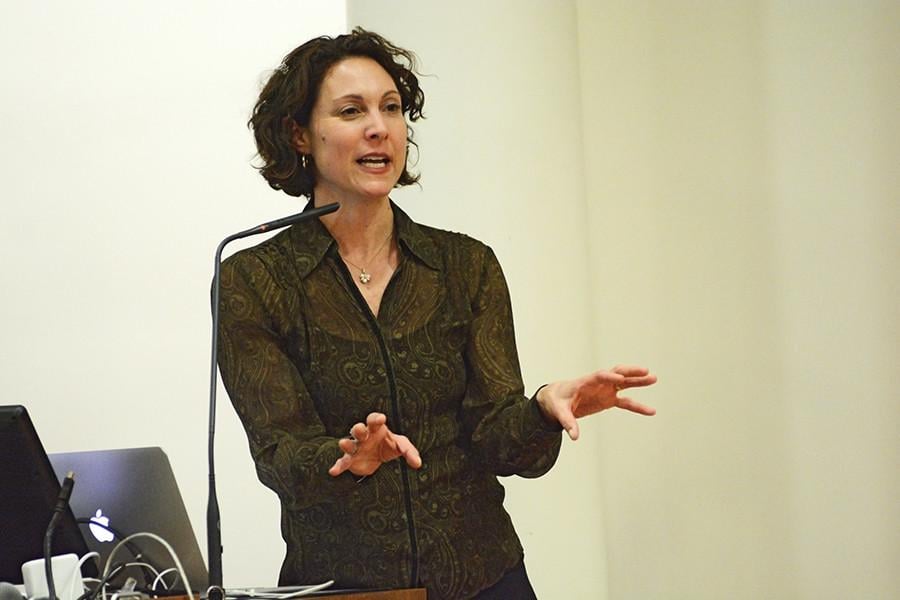New York Times Magazine writer Emily Bazelon discusses difference between journalists, advocates
Sophie Mann/Daily Senior Staffer
New York Times Magazine writer Emily Bazelon discusses the distinction between journalists and advocates in Harris Hall on Thursday night. Bazelon, who also co-hosts Slate’s “Political Gabfest” podcast, was the Contemporary Thought Speaker Series’ second speaker of this quarter.
February 5, 2016
Be careful whose voice you trust when it comes to news, New York Times Magazine writer Emily Bazelon told a crowd of about 30 students and professors on Thursday.
The journalist, author and legal expert talked about the difference between advocates and journalists when it comes to understanding important social issues. Bazelon highlighted her expertise as a journalist throughout the talk as she addressed the importance of sources when it comes to storytelling.
“In today’s world, there is an endless cornucopia of media outlets,“ Bazelon said. “Sometimes it can be difficult to distinguish which voices or stories you should listen to.”
In addition to being a staff writer for NYT Magazine, Bazelon is also a fellow of creative writing and law at Yale Law School, co-host of Slate’s Political Gabfest podcast and author of national bestseller “Sticks and Stones: Defeating the Culture of Bullying and Rediscovering the Power of Character and Empathy.”
The event was hosted by Northwestern’s Contemporary Thought Speaker Series, a student committee that invites scholars to campus to speak about their interests and accomplishments. This is the second talk in as many weeks that CTSS has held an event, as Pulitzer Prize-winning author Junot Diaz spoke at Northwestern last Thursday.
CTSS co-chair Sami Rose said Bazelon was a perfect fit for the type of speaker they were looking for.
“We aim to bring intellectuals that can speak about some of the important issues going on in the world as well as at Northwestern,” the Communication junior said. “Emily is a great speaker because of her willingness to interact with students and engage in some important dialogue about media and understanding who to listen to.”
Bazelon’s speech focused primarily on the difference between journalists and advocates. She used the national issue of Black Lives Matter to highlight some of the more important faces of media and advocacy, such as Black Lives Matter activist DeRay McKesson and New York Times columnist Charles Blow. Bazelon made a clear distinction between the two categories.
“As a journalist, my conclusions need to come out of facts,” she said. “For advocates, this isn’t always true. This is why it’s important to be aware of where someone is situated or reporting from when dealing with trusting someone’s voice or story. ”
However, Bazelon did not dismiss the credibility of advocates.
“Advocates can fill the gap that media can leave open, especially in terms of on-the-ground perspective,” she said. “It’s better to have more people talking, anyway — it helps the marketplace of ideas.”
A short Q&A session was held at the end of the event, in which Bazelon answered questions about her experience with Yale’s campus issues concerning race and free speech. She described the coverage of the issue as “just not really getting it.”
“The media was turning it into a battle between free speech and those for censorship,” she said. “Assumptions were being made that did not match the reality.”
Weinberg freshman Drew Johnson said Bazelon’s speech made him consider the difference between journalists and advocates in a way he had not previously.
“There’s a question of bias that is a little clearer now, and it makes me think about which outlet or person is more trustworthy when it comes to relaying a story,” he said.
Email: [email protected]
Twitter: @EliPanken


